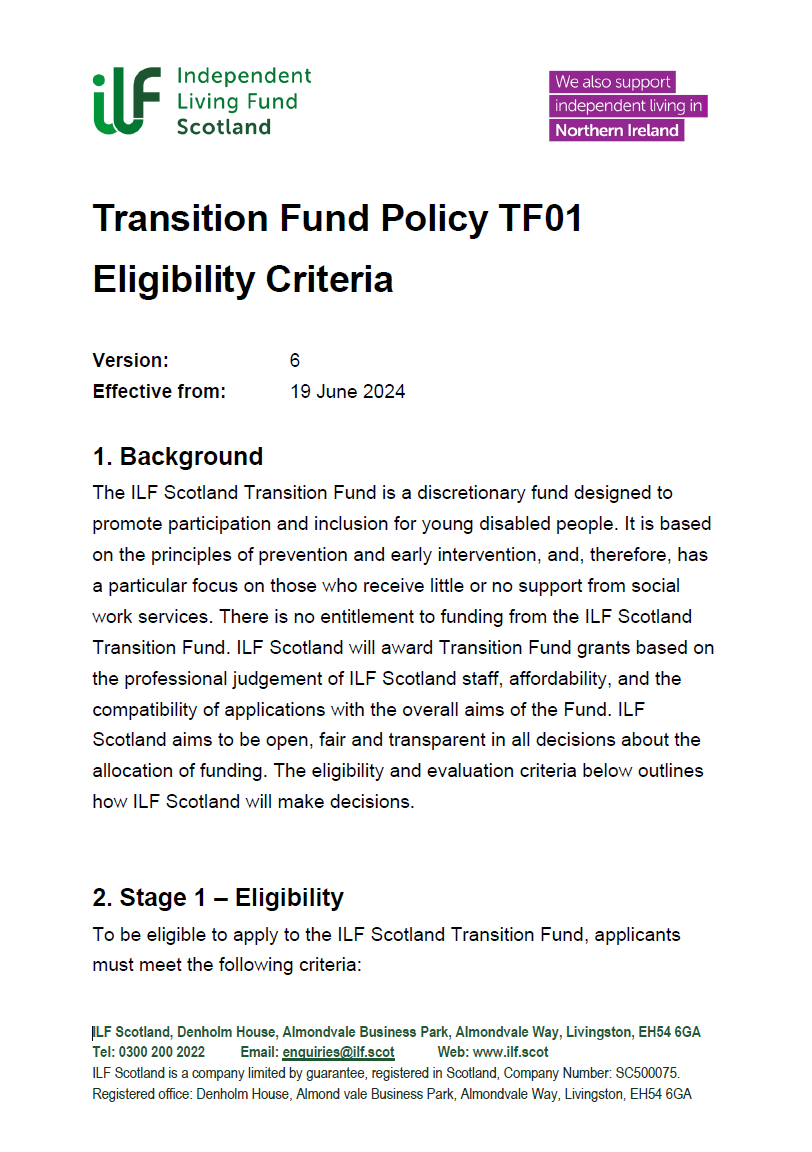
Version: 6
Effective from: 19 June 2024
The ILF Scotland Transition Fund is a discretionary fund designed to promote participation and inclusion for young disabled people. It is based on the principles of prevention and early intervention, and, therefore, has a particular focus on those who receive little or no support from social work services. There is no entitlement to funding from the ILF Scotland Transition Fund. ILF Scotland will award Transition Fund grants based on the professional judgement of ILF Scotland staff, affordability, and the compatibility of applications with the overall aims of the Fund. ILF Scotland aims to be open, fair and transparent in all decisions about the allocation of funding. The eligibility and evaluation criteria below outlines how ILF Scotland will make decisions.
To be eligible to apply to the ILF Scotland Transition Fund, applicants must meet the following criteria:
Evidence of disability will, for the purpose of this application, consist of any of the following:
a. Applicant is in receipt of any rate of any component of Disability Living Allowance / Personal Independence Payment / Adult Disability Payment / Child Disability Payment.
OR
b. A suitable professional endorses the application, confirming the young person’s disability or impairment. This can be:
The endorsing professional must know the young person well enough to comment on how their current impairment affects them and be involved in a professional capacity with the applicant, normally within the last two years.
Applicants must not have access to capital in excess of £35,000.
Applicants who meet the above criteria are eligible to apply to the ILF Scotland Transition Fund.
ILF Scotland will evaluate each eligible application to the ILF Scotland Transition Fund in relation to the eight criteria outlined below.
To be successful, submitted applications must meet each of the eight evaluation criteria. ILF Scotland will seek to provide grants to those applicants who provide clear evidence of a costed plan that is likely to achieve the outcomes or goals identified by the young person. ILF Scotland will give priority to outcomes or goals likely to have a strong, positive benefit on the young person’s life and their presence or participation in their community. ILF Scotland will evaluate applications on both the impact of the grant and the ability of the plan to achieve it. We will provide an explanation to those applicants whose application has been unsuccessful.
If you need support to complete your application, you can ask for this from a professional, family member, or friend who knows you well. If you do not have support from these sources, we will try putting you in touch with a source of help. We will give you advice on whether you are eligible for the Transition Fund. Throughout the application process, ILF Scotland will take into consideration requirements in relation to issues such as accessibility, language and communication.
ILF Scotland staff can offer informal support to facilitate the submission of an application, but the applicant should lead the application. We can provide guidance and advice but ultimately the application should clearly represent the needs and wishes of the applicant.
For more information on support that can be offered by ILF Scotland, including access to person Centred Planning where appropriate, please refer to Support to Apply to the Transition Fund | ILF Scotland.
ILF Scotland will screen all applications for eligibility and will then evaluate the applications against the evaluation criteria. ILF Scotland will ask for any additional information needed to allow full evaluation. On satisfactory receipt of all necessary information, ILF Scotland aims to process applications using the evaluation framework outlined in Appendix 1.
New grant applications will be considered from first time applicants only or from those who have previously been unsuccessful in their application.
Applicants who have previously received a Transition Fund grant may still apply for a Technology Grant for a basic IT device provided a similar device was not funded in the full Transition Fund grant.
Applicants who have previously received a Technology Grant only, can apply for a full Transition Fund Grant.
ILF Scotland will inform unsuccessful applicants why their application was unsuccessful and will advise applicants how to request a review of that decision. (Please see policy TF11.)
Applicants can also submit a formal complaint to ILF Scotland about its decision not to grant funding. (Please see the ILF Scotland Complaints Procedure.)
Unsuccessful applicants who continue to meet the eligibility criteria may re-apply. ILF Scotland may, with the applicant’s permission, retain relevant information relating to the eligibility criteria for a defined period pending reapplication. (Please see Policy TF13 Data Protection.)
First Created: 14 December 2017
Last Amended: 14 June 2024
Next Review: 31 March 2025